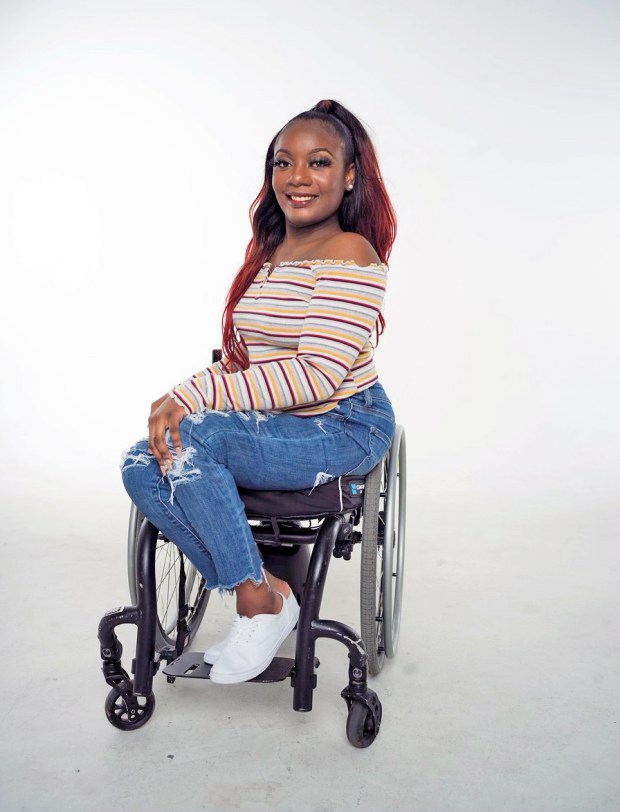Chiemeka Fevecque doesn’t let anything get in her way.
Fevecque, who turns 26 on Oct. 28, was born with syringomyelia, a spinal cord condition that affects about eight out of every 100,000 people. First, her gait was unsteady and she had trouble walking, and by age 10 she was in a wheelchair.
Fast forward to May 2022, and Fevecque found herself on the tennis courts playing the sport. It was a year after suffering a spinal cord injury when the rods from a previous surgery broke and her spinal fusion failed.
Fevecque was at an adaptive tennis clinic for players with disabilities, put on by Jim Tierney, and one of the participants told her about an Active Fund grant offered by the Kelly Brush Foundation, which could help fund her an adaptive chair to be able to play the sport more easily.
“I was told of different organizations that offered a grant and KBF was the No. 1 grant that I looked at that fit my disability,” said Fevecque, who is a pharmaceutical doctorate student at Palm Beach Atlantic University. “I applied for the grant, and it was a relatively easy process. I made sure that I personalized my application as much as possible, and I think that paid off.
“It was incredibly exciting (winning the grant),” she said. “It was the only grant I ever applied for. I felt very lucky. It was like divine intervention. I was using a loaner chair and having my own custom chair has made a difference.”
In addition to answering some questions for the grant, Fevecque also sent in just under a minute-long video essay “to put a face to the name.” She chose tennis to become more active.
“One of my personal goals was to get fit,” Fevecque said. “I tried getting a gym membership and going to the gym, but I am not that disciplined to pull that off. I really wanted to do something that incorporated fitness and community, and I looked for adaptive sports in my area and I found the (Deerfield Beach Tennis Center) tennis clinic that I started at.
“There are four adaptive tennis clinics in South Florida and luckily the one in Deerfield was the closest to me,” Fevecque said. “It meets every Tuesday, which was better than the others that didn’t have the same frequency and consistency. We get a really good turnout every week too.”
It is difficult being in a chair at any age, and Fevecque said early on she had problems with her mobility, and it eventually worsened to where she needed a wheelchair.
“I didn’t start playing tennis until last year,” she said. “I didn’t know anything about adaptive sports, and I didn’t know anyone else in a wheelchair, so I spent all of that time figuring out things for myself, like how to adjust and all of those things.
“When I took up tennis, I didn’t know the rules or how to keep score,” she said. “The main difference in adaptive tennis is the player in a chair gets two bounces. Everything else is the same — the same court size, and the same rules; I love how it is an integrative sport. You can be in a chair and play able-bodied people as well as wheelchair athletes. One of my friends is visually impaired, so it is a beginner’s sport, from the ground up.”
Her adaptive tennis coach was also the tennis coach at her high school and runs both amateur and professional adaptive tennis tournaments.
“I graduated high school with his son,” Fevecque said. “When I see him at the tennis courts, I said, ‘If you had told me about this in high school, I’d be the Coco Gauff of wheelchair tennis now.’ I would have had a 10-year head start. I was so close and yet so far.”

The cost of adaptive sports is so high that it keeps many people with disabilities from participating in sports altogether or choosing between sports and medical care. Adaptive sports equipment is almost never covered by insurance.
“We were very impressed with Chiemeka’s application,” Kelly Brush Foundation Executive Director Edie Perkins said in a statement. “She has worked very hard to recover from her spinal cord injury, and is looking to be more physically active because she believes being active will help both her physical and mental health, and strengthen connections with community, family and friends.”
“Adaptive sports equipment is very expensive,” Perkins added, “but without owning one’s own, opportunities to participate in sport can be limited by someone’s ability to travel to adaptive sports programs, which are not available in every region, and are often costly.”
To help Fevecque and others with similar mobility challenges, the Kelly Brush Foundation awards grants to help individuals purchase adaptive sports equipment and hosts adaptive sports camps.
It was founded in 2006 by Kelly Brush and her family after she sustained a spinal cord injury while racing in an NCAA alpine ski race. To date, the foundation has awarded over 1,700 adaptive equipment grants to people in 50 states. It has raised over $14.7 million.
Visit kellybrushfoundation.org.
